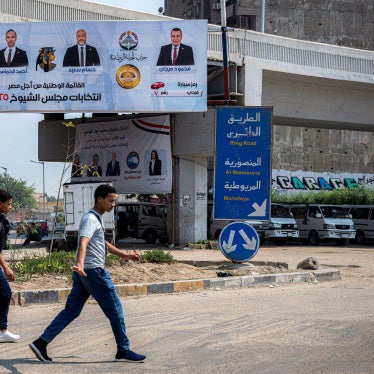(Beirut) – The hospitalization of a detained opposition figure and the death of an imprisoned labor rights activist highlight the problems that prisoners in Iran face in accessing adequate medical care and regular visits, Human Rights Watch said today. On July 2, 2013, security forces took Mir Hossein Mousavi, a 2009 presidential candidate, from house arrest to a Tehran hospital, where doctors treated him for complications related to his blood pressure. Security forces have prevented Mousavi from receiving the regular medical checks doctors had recommended for a serious heart ailment.
Mousavi’s transfer to a hospital came less than two weeks after the sudden death of a 42-year-old trade union activist, Afshin Osanlou, who was serving a five-year sentence at a prison near Tehran. Authorities say he died from a heart attack. Families and associates of other detainees serving time on politically motivated charges have said that authorities have denied them access to medical care or regular family visits, deepening their isolation and increasing fears for their safety and well-being.
“Afshin Osanlou’s untimely death and Mousavi’s hospitalization both underscore the precarious conditions for ailing prisoners in Iran, especially people being held incommunicado,” said Joe Stork, deputy Middle East director at Human Rights Watch. “Whatever the precise cause of Osanlou’s death, the shroud of secrecy and the abuses to which Iran’s political prisoners are regularly exposed shows the urgent need for far-reaching prison reform.”
A source familiar with Mousavi’s medical case told Human Rights Watch that his blood pressure fluctuates erratically due to his heart ailment. The source said that security forces have not permitted him to receive medical check-ups at least every 50 days, as doctors recommended, and prevented him from remaining in the hospital during the latest visit for medical tests. He suffers from a blocked artery and underwent angioplasty in 2011.
The authorities detained Mousavi that year, along with his wife, Zahra Rahnavard, and another prominent 2009 presidential candidate, Mehdi Karroubi. All three have been under house arrest orders since then without charge or trial. The two men had called for peaceful protests in Iran in support of the Arab uprisings in Egypt and Tunisia. During their house arrest both Mousavi and Karroubi have repeatedly complained that security forces prevent them from receiving regular visits from their family members.
There is growing concern for another detainee, Arash Sadeghi, 26, a student activist believed to be in the fifth week of a hunger strike and held in solitary confinement in Ward 209, the section of Evin Prison controlled by Iran’s Intelligence Ministry. Prison authorities have refused to provide any information about him in recent weeks, an informed source told Human Rights Watch.
The daughter of Mohammad-Reza Pourshajari, a blogger imprisoned for four years on speech-related charges, has told Human Rights Watch that authorities have refused to allow him temporary leave from prison for needed treatment for a serious heart condition.
Osanlou’s family learned on June 22 of his death at Rajai Shahr Prison in the city of Karaj, 25 kilometers from Tehran. His elder brother, Mansour Osanlou, told Human Rights Watch that he died on June 20, apparently after suffering a heart attack in prison, although prison officials insist he had been taken to a hospital before the heart attack. Osanlou’s sister, Fereshteh, said the authorities did not immediately inform the family of his death, only confirming it after the family asked about him and his whereabouts on June 22. She said medical staff told her it may take up to three months to fully determine her brother’s cause of death.
“The Iranian authorities should urgently investigate Afshin Osanlou’s death and determine whether it occurred from natural causes or was brought on by prison conditions or any form of mistreatment,” Stork said.
Authorities arrested Sadeghi on January 15, 2012, and have mostly held him in solitary confinement and prevented his family from visiting him regularly, an informed source told Human Rights Watch. The source said that Sadeghi began a hunger strike on June 1, after prison guards abused him, and that prison officials have refused to give either his family or his lawyer information about his condition.
Sadeghi was a graduate student at Tehran’s Allameh Tabatabai University who supported Mousavi’s presidential campaign in 2009. He had been arrested several times since the mass protests that followed the disputed 2009 election. On October 30, 2010, his mother suffered a fatal heart attack when officials raided the family home in Tehran while searching for Sadeghi.
He escaped arrest then but subsequently surrendered to authorities, who held him for about a year in Ward 209 of Evin Prison and then released him on December 15, 2011. According to reports by rights groups, Intelligence Ministry officials tortured and ill-treated him in prison, severely damaging his right shoulder.
Authorities arrested Sadeghi again on January 15, 2012, after Branch 26 of Tehran’s Revolutionary Court had convicted him on charges of “collusion against national security” and “propaganda against the state” and sentenced him to six years in prison. The sentence was reduced to five years on appeal, four of which were suspended. The reasons why authorities continue to hold him are not entirely clear.
Pourshajari, 53, a blogger known also by his pen name Siamak Mehr, has been refused access to necessary medical treatment since he suffered a serious heart attack in prison in October 2012, his daughter, Mitra, told Human Rights Watch. She said that authorities at Ghezel Hesar Prison in Karaj have prevented doctors from performing an angiogram requested by prison doctors and have refused to approve his temporary absence from prison if he should need treatment to unblock his arteries.
She said prison authorities transferred her father to a local hospital in March when he experienced breathing difficulties and dizziness, but quickly returned him to the prison infirmary. She said her father also suffers from gallstones and an enlarged prostate.
In a June 10 audio recording obtained by Human Rights Watch, a voice identified as Pourshajari’s says that authorities beat and tortured him and threatened to hang him after forcing him to stand on a four-legged stool during his initial detention following his arrest on September 12, 2010. He also says that authorities held him in solitary confinement for eight consecutive months and that interrogators repeatedly threatened to send him to the gallows.
In 2010, Branch 109 of the Revolutionary Court in Alborz convicted Pourshajari on charges of “acting against the national security” and “insulting Ayatollah Khomeini” for writings posted on his personal blog and sentenced him to three years in prison. In December 2011, the court also convicted him of “insulting [religious] sanctities” and added another year to his sentence.
“Prisoners have every right to get the medical care they need and to see their families,” Stork said. “Instead in case after case, we hear that ailing people are cut off from both needed care and from their families.”
Background
Security forces arrested Afshin Osanlou, a member of the Syndicate of Workers of Tehran and Suburbs Bus Company, an independent labor union increasingly targeted by the authorities, in November 2010. In a letter that he allegedly authored in August 2012 and smuggled out of prison, Osanlou said that authorities transferred him to Ward 209 of Evin prison and a detention facility run by the Intelligence Ministry in the northwest city of Sanandaj after his arrest. There, he said, they placed him in solitary confinement and tortured him, including by lashing him on the soles of his feet, over a period of five months. In 2011, Branch 15 of Tehran’s Revolutionary Court sentenced him to five years’ imprisonment after a trial lasting no more than “several minutes” but enough for the court to convict him on national security-related charges related to his union activities. He was due for release from prison early next year.
Authorities released Afshin Osanlou’s elder brother, Mansour Osanlou, former president of the Syndicate of Workers of Tehran and Suburbs Bus Company, in June 2011 after imprisoning him also for his peaceful union-related activities. Security forces arrested Mansour Osanlou near his home on July 10, 2007, and a Revolutionary Court later sentenced him to five years in prison on charges of “acting against national security” and “propaganda against the regime.” Following his release from prison, he left Iran after receiving death threats. He told Human Rights Watch that he fears the authorities may have targeted his brother in order to “settle the score” with him and delegitimize the lawful efforts of the Syndicate of Workers of Tehran and Suburbs Bus Company to promote workers’ rights.
Since 2009, Human Rights Watch has documented numerous cases of torture, ill-treatment, or medical neglect of detainees, in some cases resulting in prisoners’ deaths. Hoda Saber, for example, a journalist and political activist who was serving a prison sentence in Ward 350 of Evin Prison, died at a Tehran hospital on June 10, 2011, after going on hunger strike to protest the death of another political activist who died after security forces attacked her as she attended her father’s funeral. Prison officials transferred Saber to Evin Prison’s infirmary when he experienced chest and stomach pains on the eighth day of his hunger strike. There, according to the International Campaign for Human Rights in Iran, he was beaten severely and authorities later failed to move him to a hospital quickly when he suffered a heart attack that proved fatal.
Human Rights Watch has repeatedly called on Iran’s judiciary and prison authorities to allow political prisoners to receive regular family visits and access to the medical treatment that they need.
In 2012, Human Rights Watch urged the authorities to allow rights defender Mohammad Sadigh Kaboudvand access to medical care, to end the incommunicado detention and solitary confinement of journalist Bahman Ahamdi Amoui, and to permit Javid Houtan Kiyan (Houtan Kian), serving an 11-year sentence on national security charges, access to both family visits and treatment for a serious digestive illness.
Both international law and Iranian national law require that prison authorities afford adequate medical care to all those in their custody. Iran’s State Prison Organization regulations also provide that prison inmates be transferred to hospital outside the prison facility, when necessary. The United Nations Standard Minimum Rules for the Treatment of Prisoners require that authorities transfer all those held needing specialist treatment to specialized institutions, including civilian hospitals.
International law and Iranian national law also require prison authorities to provide all prisoners with basic necessities, to allow them regular family and other visits, and to treat them with dignity and respect. The International Covenant on Civil and Political Rights, to which Iran is a state party, prohibits torture and other cruel, inhuman, or degrading treatment or punishment.








